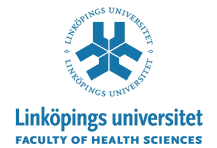 |
Visa svensk kursplan |
|
COURSE CATEGORY Single subject course MAIN FIELD OF STUDY Medical Biology SUBJECT AREA Medical Biology |
COURSE CODE | 8FA229 |
tumour development in general including the genetic basis of human cancer. Furthermore, the course will give an overview of cancer by site taking into account different clinical and biological aspects as well as the occurrence of specific gene alterations. The course is elective semester one or three in the Master’s Programme in Experimental and Medical Biosciences.
LEARNING OUTCOMES
By the end of the course the students will be able to:
Knowledge and understanding
- Analyze and discuss specific capabilities of cancer cells and how the biological/genetic alterations occur for normal cell to tumor cell
- Integrate knowledge in tumour biology in different types of malignancies in relation to environmental factors, gender, age, hormonal influence, and molecular alterations
Competence and skills
- Design an experiment in order to analyse how the alterations in cell signalling may interfere with the cellular response to damage
Judgement and approach
- Analyze and assess experimental results in tumour biology
- Evaluate and discuss new hypotheses in the field of cancer research
- Mechanisms of tumour development, invasion and metastasis
- Concepts in cancer genetics including oncogene, tumour suppressor gene, mismatched repaired genes, and apoptosis related genes
- Control of the cell cycle and cancer
- Angiogenesis and cancer
- Hormones and cancer
- Stem cells and cancer
- Tumour immunology
- The principle of tumour diagnosis and treatment
Specific: In this course lectures, tutorial groups, seminars, and laboratory work are used.
Active participation in the compulsory parts is necessary to pass the course, and assessment of them is carried out continuously. Compulsory parts in this course are: tutorial groups, laboratory work, and seminars.
EXAMINATION
Individual written examination.
Individual written report of laboratory work.
SCOPE OF RE-EXAMINATION
The extent of a re−examination shall be similar to the regular examination.
CHANGE OF EXAMINERS
Students who have failed the course or part of the course twice are entitled to request another examiner for the following examination occasion, unless specific reasons are present.
REGISTRATION FOR EXAMINATION
The procedure for registration should be stated prior to the commencement of each course. In other respects, regulations concerning examination and examiners are applied in accordance with Linköping University policy.
Applicants must also have documented knowledge of English equivalent to Engelska B/Engelska 6; i.e. an internationally recognized test, e.g. TOEFL (minimum scores: Paper based 575 + TWE-score 4.5, and internet-based: Score of 20 (scale 0-30) in written test, total score of 90), IELTS, academic (minimum score: Overall mark of 6.5 and no section below 5.5), or equivalent.
The course is carried out in such a way that both men’s and women’s experience and knowledge is made visible and developed.
If the course is withdrawn, or is subject to major changes, examinations according to this course plan are normally offered on a total of three occasions within one year, one of them in close connection to the first examination.
|
||||||||||||||||||||||||||||||||||||||||||||||||||||||||||||||||||||||||||||||